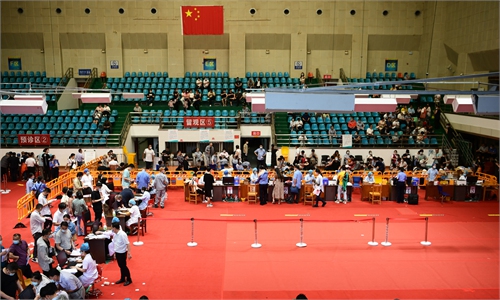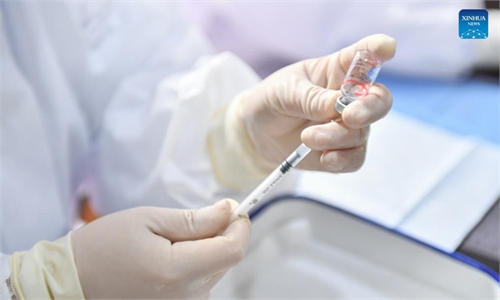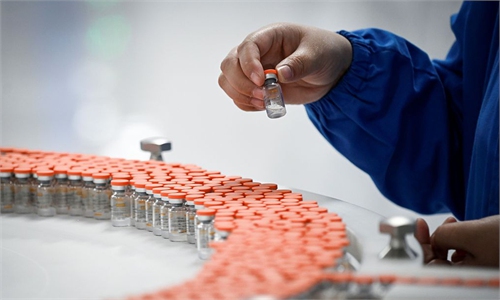Political advisor urges faster approval of innovative COVID-19 vaccines, steppingstone for border reopening

Photo: CFP
As China ramps up immunization with over 87 percent of the population getting full-course COVID-19 vaccines, a Chinese political advisor called on the government to approve and adopt second-generation COVID-19 vaccines with improved quality and safety as early as possible to enhance national immunization levels and prepare for border reopening.
While further extending the full range of vaccine coverage, China should accelerate efforts to strengthen overall immunity levels in 2022 with more diverse vaccine types for booster shots that can reactivate the level of antibodies against the virus and mutant strains, according to a motion suggested by Zhu Tao, a member of the 13th National Committee of the Chinese People's Political Consultative Conference (CPPCC).
Zhu, also the chief scientist of frontrunner COVID-19 vaccine producer CanSinoBIO, suggested that widely-used inactivated COVID-19 vaccines have provided solid immunity foundation for most Chinese. However, second-generation vaccines, such as inhaled and mRNA vaccines or Omicron-specific shots, are needed for beefing up herd immunity.
That is an important prerequisite for the Chinese government to lift global travel restrictions, as it is risky to reopen the border carelessly considering that the effects of COVID-19 are still alarming, Zhu noted.
In his proposal, Zhu said that the quick development of Chinese COVID-19 vaccines has brought more innovative types of jabs into phase I and II clinical trials, and many of them have a better efficacy than traditional inactivated shots.
"If China fails to speed up the introduction of these vaccines and instead relies only on first-generation shots, we risk losing our advantage in the second half of the fight against the pandemic," said the motion.
COVID-19 vaccine is the only way for the vast majority of Chinese to be immunized, while more people in Western countries are being infected with the Omicron variant under loose anti-epidemic policies, which is a second-round immunity after vaccination, Zhu explained.
"So, we need stronger vaccines with better quality and further promote a diversity of shots in the booster scheme," said Zhu.
Zhu told the Global Times that the inhaled adenovirus vector vaccine developed by CanSinoBIO is under clinical trials to be used as a booster. Taking the inhaled vaccine simulates the process of natural infection and it can induce human respiratory mucosal immunity. It is expected to be the first approved inhalation vaccine in China, Zhu said.
Meanwhile, Omicron-specific shots, domestic mRNA vaccines and nasal spray vaccines are also being developed in China.
On February 19, China officially approved mixed booster shots for people who have been fully vaccinated for at least six months amid the rapid spread of the highly transmissible Omicron variant. The adenovirus-vector recombinant vaccine produced by CanSinoBIO and the recombinant novel coronavirus vaccine by Anhui Zhifei Longcom are listed as choices of boosters.
Zhu's other proposal calls for closer cooperation in vaccine R&D and production with Belt and Road Initiative (BRI) signatories, such as jointly funded production lines, technology transfer, talent investment and improved exchange mechanisms.
Zhu encourages licensing vaccine bulk production in more BRI countries to share Chinese wisdom in vaccine development. Research institutions can also participate in detection of future infectious disease by taking advantage of worldwide R&D centers as virus outposts.
The COVID-19 vaccine is like a "ticket" for Chinese shots to enter the global market because the world has to recognize the high quality of Chinese vaccines which therefore promote the export of other Chinese vaccines in the future.
Zhu also encouraged more domestic companies to develop and produce pharmaceutical supplies for vaccine production, given that vaccine producers are highly dependent on overseas imports. Additionally, Zhu welcomed more foreign pharmaceutical companies to set up factories in China, as last year's global shortage of supplies made the country realize the importance of developing supply autonomy.




